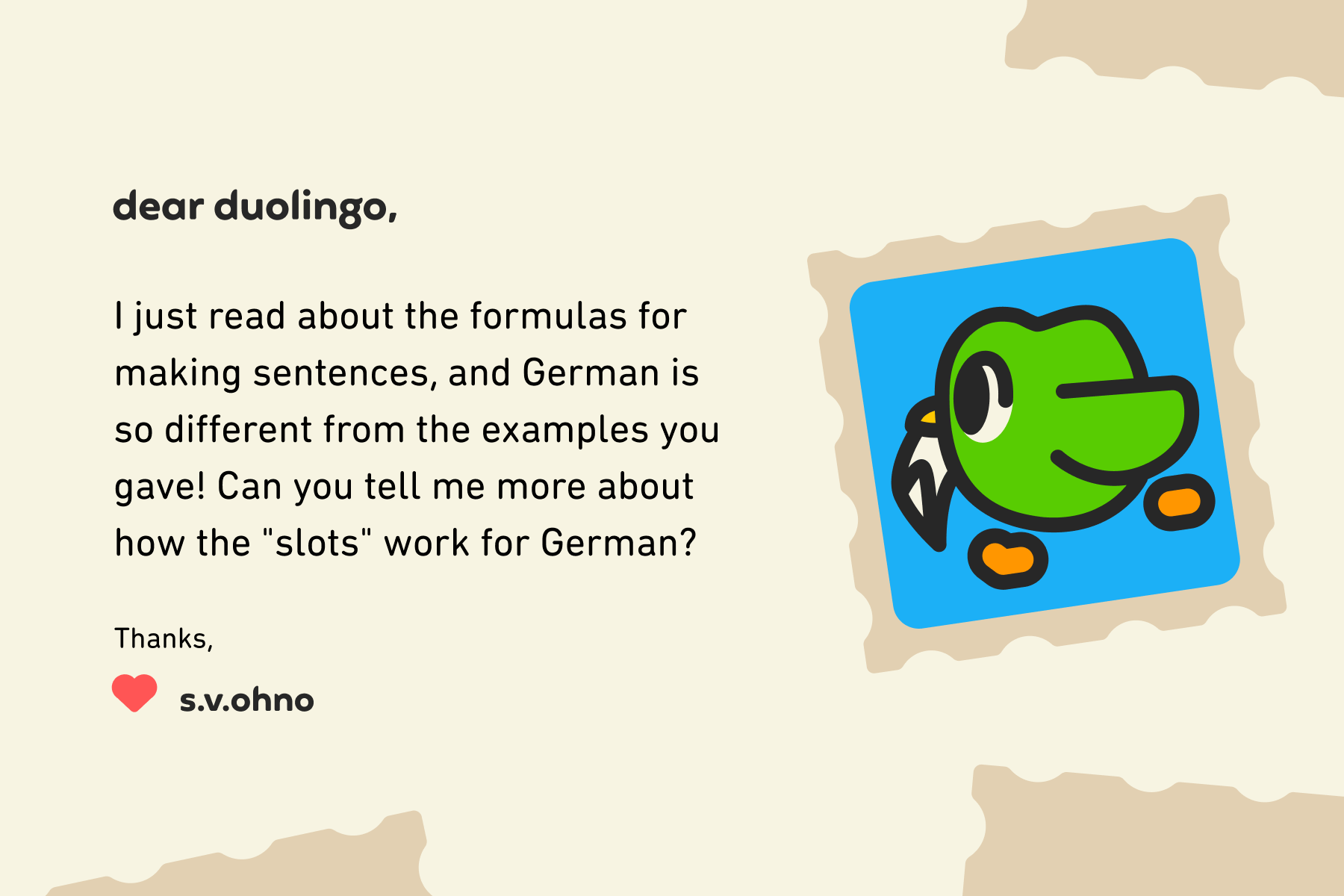Welcome to another week of Dear Duolingo, an advice column just for language learners. Catch up on past installments here.
Hallo, Duolingo learners! This week we've got another great question about German and how to form sentences. We've talked before about using little "formulas" to help you build sentences in a new language, and this is especially useful for German learners. This week's question makes it clear why. Let's take a look!
Our question this week:

Great question! (If you haven’t read our post about sentence structure, start here!) You’re right, S.V.OhNo, German has several formulas that beginners need to know, so let’s dig in!
What makes German sentence structure different from English
In basic English sentences, we generally start with the subject, followed by the verb, followed by the object, as in The woman is reading the newspaper. German will often use this order, too (Die Frau liest die Zeitung), but there's another factor to take into account: the second slot. 👀
In German, the second slot of the sentence is always saved for a verb. In sentences with multi-word verbs, like "was singing" or "would like to go," the conjugated verb gets that privileged second slot. You might see this referred to as verb second, or V2: The verb gets the second slot. (For advanced learners: The whole story is more complicated than this, but this is the rule for all the basic sentences!)
One challenge to learning the German formulas for sentence structure is deciding where the second slot is! This second slot isn't the same as the second word—it can be the second word, but it could also be the third, fourth, seventh, or even tenth word! Whatever is in the first slot will be words or phrases that go together, most likely a pronoun, a phrase about a noun, an adverb about when something happened, or a phrase with a preposition. Here are some examples of phrases you might find in the first slot of a sentence:
- Pronouns and names: Ich (I), du (you), Sie (you formal), ihr (you all), Karl, Frau Graf, Alex und Nina
- Phrase about a noun: meine Tochter (my daughter), die alte Kirche (the old church), die schönen Blumen im Garten (the pretty flowers in the garden)
- Adverbs about time and place: heute (today), morgen (tomorrow), da drüben (over there)
- Phrase with a preposition: für mich (for me), in der Nähe (nearby), außer meiner besten Freundin (except for my best friend)
As you can see, some are just one word long, and others are longer.
How to form German sentences with one verb
If a sentence in German has a one-word verb, that verb always goes in the second slot in our German sentence formula. (Remember to think of slots and not individual words!) Even if the first slot includes multiple words, the verb goes in the second slot—so sometimes the rest of the sentence can sound backwards to English speakers!
| First slot | Second slot (for verb) | Rest of sentence | Translation |
|---|---|---|---|
| Ich (I) |
heiße (am named) |
Kristina (Kristina) |
My name is Kristina. |
| Das Brot (the bread) |
ist (is) |
sehr lecker (very delicious) |
The bread is very delicious. |
| Heute (today) |
habe (have) |
ich einen Termin (I an appointment) |
Today I have an appointment. |
| Der berühmte Roman von Goethe (the famous novel by Goethe) |
ist (is) |
sehr kompliziert (very complicated) |
The famous novel by Goethe is very complicated. |
How to form German sentences with 2 verbs
If a sentence in German has a 2-part verb, like "can sing," you'll still fill the second slot with a verb, and you'll save the second verb for the end of the sentence. This can definitely feel unusual for English speakers: You're basically carrying that second verb with you, past the rest of the sentence, to the end. That also means you sometimes won't know what the main action of the sentence is until you reach the last word!
The verb in the second slot will still be the one that's conjugated (the one that matches the subject of the sentence). The verb that's saved for the last slot will be an infinitive (like gehen "to go" and machen "to make") or another verb form that doesn't change for the subject (like gesungen "sung" or gespielt "played").
| First slot | Second slot (for verb) | Rest of sentence | Slot for 2-part verb | Translation |
|---|---|---|---|---|
| Ich (I) |
möchte (would like) |
ins Café (to the café) |
gehen (to go) |
I would like to go to the café. |
| Wir (we) |
sind (are) |
am Wochenende ins Konzert (on the weekend to the concert) |
gegangen (gone) |
We went to the concert on the weekend. |
| Mia (Mia) |
will (wants) |
am Sonntag eine Party (on Sunday a party) |
machen (to make) |
Mia wants to have a party on Sunday. |
How to form German questions
There are 2 formulas for questions in German, depending on whether the question has a question word, like wann (when) or was (what), or if it's a question you can answer with a simple yes or no, like Hast du einen Hund? (Do you have a dog?).
For questions with question words:
The question word goes in the first slot and the verb goes in the second slot—as usual! This is a lot like in English, where we flip the order of the subject and verb in these kinds of questions (like in "Where is the museum?" versus "The museum is downtown").
Notice that if the question has welche (which), welche is part of a larger noun phrase, and the whole thing will always stick together in the first slot, before the verb.
| First slot (for question word) | Second slot (for verb) | Rest of sentence | Slot for 2-part verb | Translation |
|---|---|---|---|---|
| Woher (from where) |
kommen (come) |
Sie (you formal) |
Where are you from? | |
| Wann (when) |
hast (have) |
du Geburtstag (you birthday) |
When is your birthday? | |
| Welche Sprachen (which languages) |
möchte (would like) |
er (he) |
lernen (to learn) |
Which languages would he like to learn? |
For yes/no questions:
In questions that can be answered with "yes" or "no," the verb goes first, before the subject and the rest of the sentence. We do this in English with the verb "to be": "Are you happy here?" and "Is your cat sleeping?"
| Verb | Subject | Rest of sentence | Slot for 2-part verb | Translation |
|---|---|---|---|---|
| Feiert (are celebrating) |
ihr (you all, informal) |
im Park oder zu Hause (at the park or at home) |
Are you all celebrating at the park or at home? | |
| Ist (is) |
der Tisch (the table) |
zu groß (too big) |
Is the table too big? | |
| Möchtet (would like) |
ihr (you all, informal) |
jetzt (now) |
essen (to eat) |
Would you all like to eat now? |
Take German sentences one slot at a time
This is a lot of information for sure! Focus on practicing one kind of sentence or question at a time, and use these slots as a sort of formula when you're doing your German lessons. There are additional rules to learn for sentences with negation words (like kein "no" and nicht "not") and multi-part sentences, so plan to work on one type of sentence at a time and build up your proficiency from there! 💪
For more answers to your language and learning questions, get in touch with us by emailing dearduolingo@duolingo.com.



